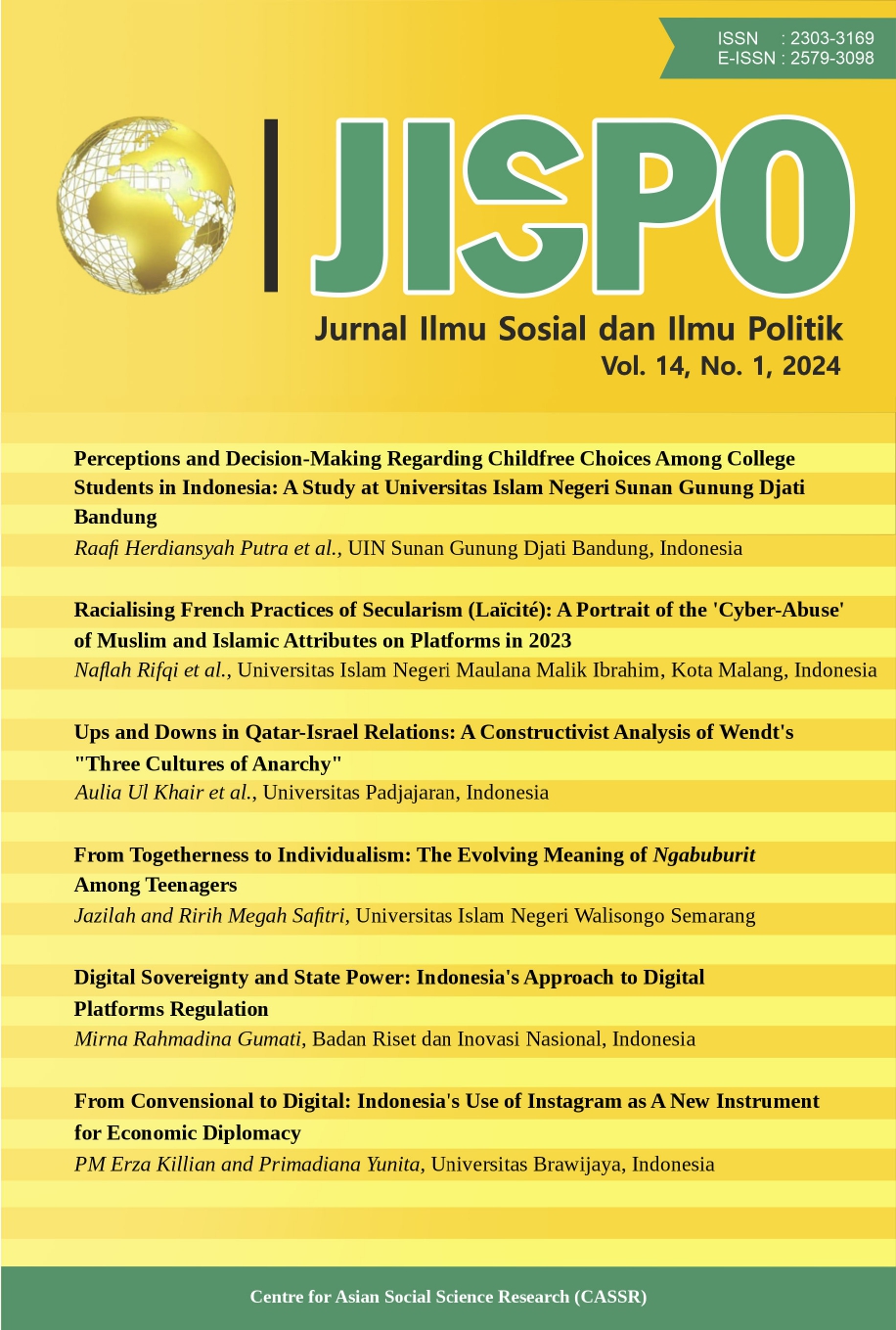Perceptions and Decision-Making Regarding Childfree Choices Among College Students in Indonesia: A Study at Universitas Islam Negeri Sunan Gunung Djati Bandung
DOI:
https://doi.org/10.15575/jispo.v14i1.35426Keywords:
Childfree, Perception, College Students, Decision Making, UIN BandungAbstract
References
Antara News. 2023. “Korea Catat Penurunan Jumlah Penduduk Akibat Angka Kelahiran Rendah.†Antara News. https://www.antaranews.com/berita/3746016/korsel-catat-penurunan-jumlah-penduduk-akibat-angka-kelahiran-rendah
Audinovic, Vizcardine, and Rio Satria Nugroho. 2023. “Persepsi Childfree Di Kalangan Generasi Zillenial Jawa Timur.†Jurnal Keluarga Berencana 8(1):1–11.
Badan Pusat Statistik. 2020. “Pertumbuhan Penduduk Dan Bonus Demografi Indonesia.†Badan Pusat Statistik. https://www.bps.go.id/id/pressrelease/2021/01/21/1854/hasil-sensus-penduduk--sp2020--pada-september-2020-mencatat-jumlah-penduduk-sebesar-270-20-juta-jiwa-.html
Dahnia, Ana Rita, Anis Wahda Fadilla Adsana, and Yohanna Meilani Putri. 2023. “Fenomena Childfree Sebagai Budaya Masyarakat Kontemporer Indonesia Dari Perspektif Teori Feminis (Analisis Pengikut Media Sosial Childfree).†Al YAZIDIY: Ilmu Sosial, Humaniora, Dan Pendidikan 5(1):66–85.
Ela, Mika, Aisyah Savira, Nabila Utami Sandra Dewi, and Febi Triyanti. 2022. “Fenomena Childfree Di Jepang Dalam Perspektif Teori Feminisme Eksistensialis.†Regalia: Jurnal Gender Dan Anak 1(2):61–72.
Fakriansyah. 2023. “Awal Mula Childfree: Masif Di Barat Kini Ditiru Di RI.†CNBC Indonesia. https://www.cnbcindonesia.com/lifestyle/20230211210404-33-413020/awal-mula-childfree-masif-di-barat-mulai-ditiru-di-ri
Fillaili, Natasya Nur, and Martini. 2023. “Trend Bebas Anak Child Free Di Kalangan Pasangan Milenial Pasca Menikah.†Edukasi IPS 7(1):36–44.
Frejka, Thomas. 2017. “Childlessness in The United States .†Demographic Research Monographs.
Gallagher, James. 2020. “Tingkat Kesuburan Dunia Akan Menurun Drastis, Dampaknya Akan ‘Mengkhawatirkan’ Bagi Masyarakat.†BBC News. https://www.bbc.com/indonesia/dunia-53413810
Haganta, Karunia, Firas Arrasy, and Siamrotul Ayu Masruroh. 2022. “Manusia, Terlalu (Banyak) Manusia: Kontroversi Childfree Di Tengah Alasan Agama, Sains, Dan Krisis Ekologi.†Konferensi Integrasi Interkoneksi Islam Dan Sains 4(1):309–20.
Hanandita, Tiara. 2022. “Konstruksi Masyarakat Tentang Hidup Tanpa Anak Setelah Menikah.†Jurnal Analisa Sosiologi 11(1):126–36.
Hilmy, Muhammad Irfan Rahman. 2023. “Persepsi Mahasiswa Tentang Childfree (Pasangan Suami Istri Tanpa Anak) : Penelitian Pada Mahasiswa Jurusan Sosiologi Angkatan 2018 Fakultas Ilmu Sosial Dan Politik Universitas Islam Negeri Sunan Gunung Djati.†Undergraduate Thesis, Universitas Islam Negeri Sunan Gunung Djati , Bandung.
Jamaludin, Adon Nasrullah. 2021. Metode Penelitian Sosial. Bandung: Pusat Penelitian dan Penerbitan UIN Bandung.
Muthohiroh, Indah, and Achmad Arifin. 2023. “Isu Childfree Dalam Perspektif Al-Quran : Analisis Tafsir Tematik Konseptual.†Al-Munir: Jurnal Ilmu Al-Quran Dan Tafsir 5(1):43–82.
Nawawi, Hadari. 2015. Metode Penelitian Bidang Sosial. Yogyakarta: Gajah Mada University Press.
Nugroho, Dhimas Adi, Fitri Alfarisy, Afizal Nuradhim Kurniawan, and Elin Rahma Sarita. 2022. “Tren Childfree Dan Unmarried Di Kalangan Masyarakat Jepang.†COMSERVA: Jurnal Penelitian Dan Pengabdian Masyarakat 1(11).
Rahmayanti, Novalinda. 2022. “Childfree Sebagai Pilihan Hidup Perempuan Bekeluarga Di Kabupaten Sidoarjo.†Undergraduate Thesis, Universitas Islam Negeri Sunan Ampel, Surabaya.
Ramdhani, Kembang Wangsit, and Devina Tsabitah. 2022. “Fenomena Childfree Dan Prinsip Idealisme Keluarga Indonesia Dalam Perspektif Mahasiswa.†LoroNG: Media Pengkajian Sosial Budaya 11(1):17–29.
Siswanto, Ajeng Wijayanti, and Neneng Nurhasanah. 2022. “Analisis Fenomena Childfree Di Indonesia.†Bandung Converence Series: Islamic Family Law 2(2).
Sugiyono. 2013. Metode Penelitian Kuantitatif, Kualitatif, Dan R&D. Bandung: Alfabeta.
Tunggono, Victoria. 2021. Childfree & Happy. Yogyakarta: Buku Mojok Group.
UIN Sunan Gunung Djati Bandung. 2023. “Visi, Misi Dan Tujuan UINSGD.†Retrieved from https://uinsgd.ac.id/tentang-uin-sgd/visi-misi/#:~:text=Visi%20dan%20Misi%20UIN%20Sunan,Asia%20Tenggara%20pada%20tahun%202025.
World Bank. 2023. “Population Growth Japan 2022.†Word Bank. https://data.worldbank.org/indicator/SP.POP.GROW?locations=JP
Downloads
Additional Files
Published
How to Cite
Issue
Section
Citation Check
License
Authors who publish their manuscripts in JISPO agree to the following terms:
- Authors retain copyright and grant the journal right of first publication with the work simultaneously licensed under a Creative Commons Attribution-ShareAlike 4.0 International License that allows others to share the work with an acknowledgment of the work's authorship and initial publication in this journal;
- Authors are able to enter into separate, additional contractual arrangements for the non-exclusive distribution of the journal's published version of the work (e.g., post it to an institutional repository or publish it in a book), with an acknowledgment of its initial publication in this journal; and
- Authors are permitted and encouraged to post their work online (e.g., in institutional repositories or on their websites) after publication process, or prior to and during the submission process, as it can lead to productive exchanges, as well as earlier and greater citation of published work (See The Effect of Open Access).




.jpg)



